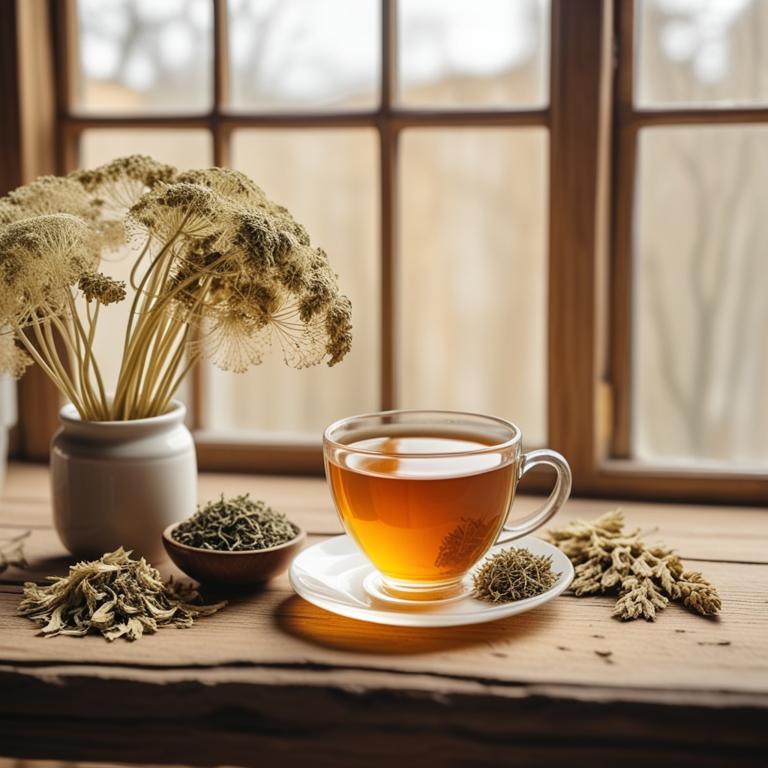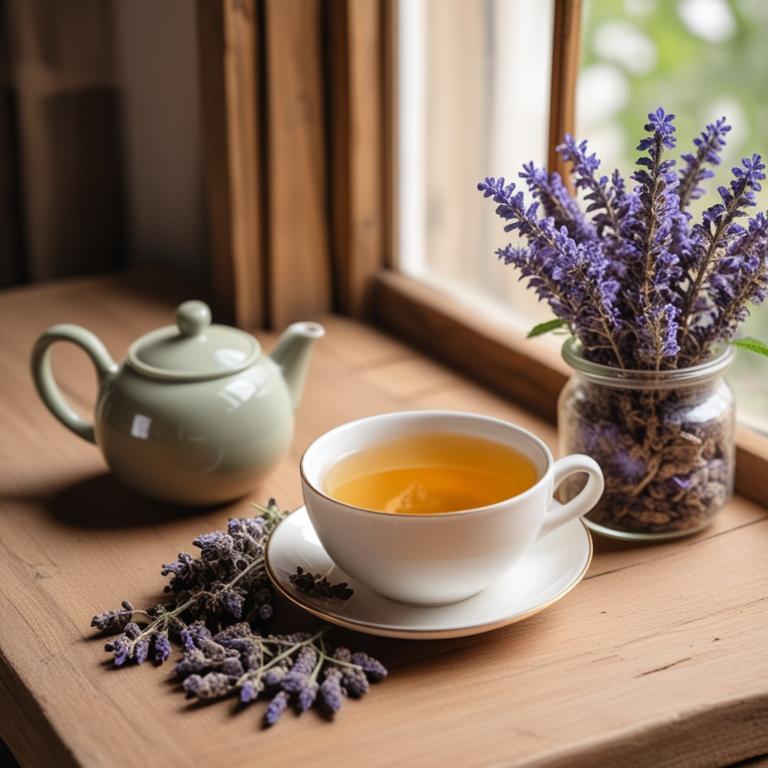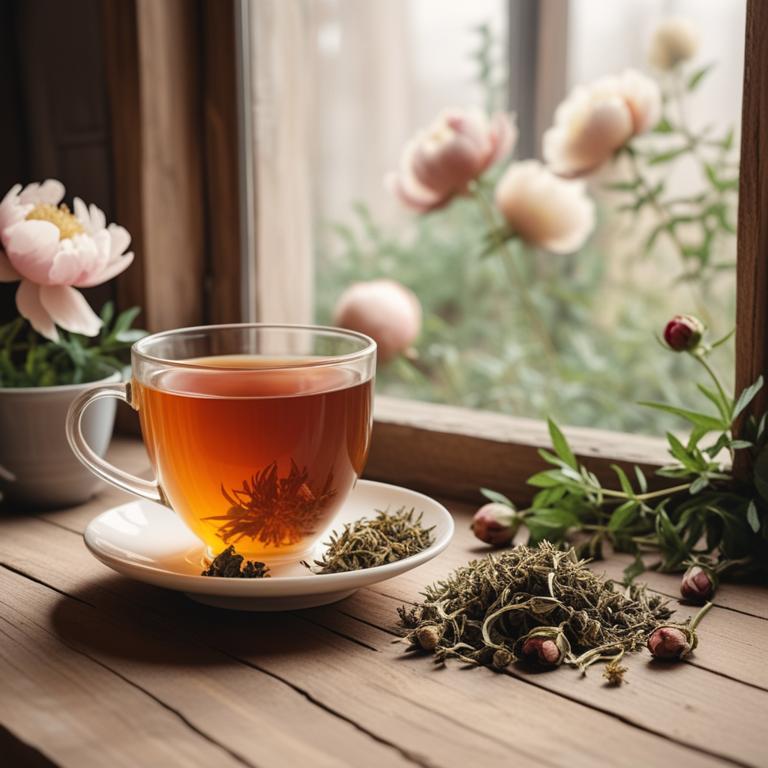8 Herbal Teas For Over Bleeding During Periods

If you're experiencing heavy bleeding during your period, you might want to try herbal teas for some relief.
Heavy bleeding can be really uncomfortable and affect your daily life. Herbal teas can help because they contain special compounds that can calm the uterus and reduce bleeding. One example is Vitex agnus-castus, also known as chasteberry. It's a plant that has been used for centuries to help regulate menstrual cycles and reduce heavy bleeding. Vitex works by balancing hormones in the body, which can help slow down heavy bleeding. Another example is Paeonia lactiflora, also known as peony root. It's a plant that has anti-inflammatory properties, which can help reduce swelling and bleeding in the uterus.
Paeonia lactiflora can also help relax the muscles in the uterus, making it less likely to contract and cause heavy bleeding. Ginkgo biloba is another example of a herb that can help with heavy bleeding. It's known for its ability to improve blood flow and reduce inflammation, which can help reduce bleeding. Ginkgo biloba can also help reduce symptoms of anxiety and stress, which can also contribute to heavy bleeding. Drinking herbal teas like these can bring many benefits to your life. Not only can they reduce heavy bleeding, but they can also help you feel more relaxed and calm. Many people find that herbal teas can help them sleep better, improve their mood, and reduce symptoms of anxiety and stress.
By drinking herbal teas regularly, you can take control of your menstrual cycle and reduce the discomfort of heavy bleeding.
- 1. Vitex agnus-castus
- 2. Paeonia lactiflora
- 3. Ginkgo biloba
- 4. Zingiber officinale
- 5. Glycyrrhiza glabra
- 6. Lavandula angustifolia
- 7. Hypericum perforatum
- 8. Angelica sinensis
1. Vitex agnus-castus

Vitex agnus-castus teas contains bioactive constituents like flavonoids and phenolic acids, which have anti-inflammatory and antioxidant properties.
These compounds help to regulate hormonal balance and reduce prostaglandin production, which can contribute to heavy menstrual bleeding. The tea also contains iridoid glycosides, particularly aucubin, which has a uterine relaxant effect that can help to reduce uterine contractions and bleeding. The antispasmodic properties of aucubin may also help to calm the uterine muscles and alleviate cramping associated with heavy periods.
Regular consumption of Vitex agnus-castus tea may help to regulate menstrual flow and alleviate symptoms of over bleeding during periods.
- Gather 1 cup of fresh or dried Vitex agnus-castus leaves and flowers.
- Combine the leaves and flowers with 1 cup of boiling water in a saucepan.
- Let the mixture simmer for 5-10 minutes, then turn off the heat.
- Strain the liquid into a cup and discard the solids. You can add honey to taste.
- Drink the tea 1-2 times a day, 1-2 weeks before your period starts to help reduce bleeding.
2. Paeonia lactiflora

Paeonia lactiflora teas contains a compound called paeoniflorin, which helps to stop bleeding during periods by reducing inflammation and congestion in the uterus.
The tea also contains a flavonoid called paeonol, which has a soothing effect on the uterus and helps to slow down blood flow. Paeoniflorin and paeonol work together to reduce cramping and heavy bleeding, making Paeonia lactiflora teas a popular natural remedy for menstrual issues. Additionally, the tea contains alkaloids like benzylisoquinoline, which help to relax the uterine muscles and reduce bleeding.
Regular consumption of Paeonia lactiflora teas may help to regulate menstrual cycles and reduce the severity of symptoms associated with over bleeding.
- Gather 2 cups of fresh Paeonia lactiflora flowers and 1 cup of water.
- Dry the flowers in a low-temperature oven (150°F) for 1 hour.
- Steep 2 tablespoons of dried flowers in 1 cup of boiling water for 5-7 minutes.
- Strain the mixture through a cheesecloth or fine-mesh sieve into a cup.
- Drink the tea 2-3 times a day to help reduce bleeding during periods.
3. Ginkgo biloba

Ginkgo biloba teas contains flavonoids and terpenoids as its bioactive constituents.
These compounds help to reduce menstrual bleeding by acting as a uterine tonic, which helps to regulate blood flow and prevent excessive bleeding. Flavonoids, specifically quercetin and kaempferol, have antioxidant and anti-inflammatory properties that may help to reduce inflammation and promote healing in the uterine lining. Terpenoids, such as ginkgolides and bilobalide, have a vasoconstrictive effect, which can help to reduce blood loss by constricting blood vessels.
By balancing blood flow and promoting uterine health, Ginkgo biloba teas may help to alleviate symptoms of over bleeding during periods.
- Gather 1 teaspoon of dried Ginkgo biloba leaves and 1 cup of boiling water.
- Steep the Ginkgo biloba leaves in the boiling water for 5-7 minutes.
- Strain the liquid into a cup and discard the leaves.
- Add 1 teaspoon of honey to the liquid, if desired, and stir well.
- Drink the tea 2-3 times a day, 1-2 weeks before your period, to help reduce bleeding.
4. Zingiber officinale

Zingiber officinale teas contains a bioactive compound called gingerol, which has anti-inflammatory properties that help to reduce bleeding during periods.
The compound also contains shogaols, which have antioxidant properties that help to regulate prostaglandins, hormone-like substances that can cause the uterus to contract and lead to heavy bleeding. The anti-inflammatory properties of gingerol and shogaols also help to reduce pain and cramping associated with heavy bleeding. Additionally, the tea's flavonoids, such as kaempferol and quercetin, have been shown to have a regulatory effect on hormones and help to reduce bleeding.
The combination of these compounds in Zingiber officinale teas may help to reduce the severity of over bleeding during periods by regulating hormone levels and reducing inflammation.
- Gather 1 cup of water and 1 tablespoon of dried Zingiber officinale root.
- Boil the water in a pot and let it cool for 1 minute.
- Add 1 tablespoon of dried Zingiber officinale root to the pot.
- Let the mixture simmer for 5-7 minutes, then strain it into a cup.
- Drink the tea 2-3 times a day to help control heavy bleeding during periods.
Zingiber Officinale Tea on Amazon
FGO Organic Ginger Tea, 100 Count, Eco-Conscious Tea Bags, Caffeine Free, Packaging May Vary (Pack of 1)
Disclaimer: We earn a commission if you click this link and make a purchase at no additional cost to you.
5. Glycyrrhiza glabra

Glycyrrhiza glabra teas contains bioactive constituents like glycyrrhizin and flavonoids.
These compounds help reduce inflammation and slow down bleeding due to their antispasmodic and astringent properties. Glycyrrhizin, in particular, has a natural ability to constrict blood vessels, which helps decrease blood loss during periods. The flavonoids, on the other hand, have antioxidant properties that help regulate hormonal imbalances that may contribute to heavy bleeding.
By consuming Glycyrrhiza glabra teas, some people experience relief from excessive menstrual bleeding due to its natural ability to regulate and reduce blood flow.
- Gather 1 cup of boiling water and 1 teaspoon of dried Glycyrrhiza glabra root in a tea infuser or a small muslin bag.
- Steep the root in the boiling water for 5-7 minutes. You can let it steep for a bit longer if you prefer a stronger tea.
- Strain the tea into a cup using the tea infuser or muslin bag. Discard the root.
- Add 1 tablespoon of honey to the tea if you want it sweet. You can also add a slice of lemon if you prefer.
- Drink the tea 2-3 times a day for a week before your period starts to help reduce bleeding.
6. Lavandula angustifolia

Lavandula angustifolia teas contains several bioactive constituents that help alleviate over bleeding during periods.
These constituents include apigenin, linalool, and linalyl acetate, which have anti-inflammatory and antispasmodic properties. These properties help to reduce inflammation and cramping in the uterus, which can contribute to heavy bleeding. Apigenin, in particular, has been shown to have a positive effect on the endometrium, helping to regulate menstrual flow and reduce excessive bleeding.
By reducing inflammation and regulating menstrual flow, Lavandula angustifolia teas can help provide relief from over bleeding during periods.
- Gather 1 cup of boiling water and 1 tablespoon of dried Lavandula angustifolia flowers.
- Steep the flowers in the boiling water for 5-7 minutes.
- Strain the mixture into a cup using a tea strainer or a piece of cheesecloth.
- Drink 1 cup of the tea 2-3 times a day to help with over bleeding during periods.
- Consult a doctor or a healthcare professional before using Lavandula angustifolia tea as a treatment for heavy menstrual bleeding.
7. Hypericum perforatum

Hypericum perforatum teas contains flavonoids, tannins, and volatile oils, which have anti-inflammatory and antispasmodic properties.
Flavonoids like hyperoside and quercetin help to reduce inflammation in the uterus and ease menstrual cramps. The tannins in the tea have astringent properties that can help to stop excessive bleeding by contracting the blood vessels. Volatile oils like limonene and beta-pinene have antispasmodic effects, which can help to relax the uterine muscles and reduce bleeding.
Drinking Hypericum perforatum teas may help to regulate menstrual flow and reduce heavy bleeding during periods.
- Gather 1 cup of fresh Hypericum perforatum leaves and flowers.
- Dry the Hypericum perforatum in a warm place, or use a food dehydrator.
- Take 1 teaspoon of dried Hypericum perforatum and place it in a cup.
- Add 1 cup of boiling water to the cup and let it steep for 5-10 minutes.
- Strain the tea and drink 1/2 to 1 cup, 2-3 times a day, to help reduce heavy bleeding during periods.
8. Angelica sinensis

Angelica sinensis teas contains bioactive constituents like ferulic acid, ligustilide, and butylphthalide.
These compounds have anti-inflammatory properties, which help reduce menstrual cramps and alleviate heavy bleeding. The anti-inflammatory properties also help slow down blood flow and strengthen the blood vessels, preventing excessive bleeding. The antioxidants in Angelica sinensis teas, such as ferulic acid, help protect the body from oxidative stress and promote healing.
By reducing inflammation and promoting healing, Angelica sinensis teas may help regulate menstrual flow and alleviate over-bleeding during periods.
- Gather 1 cup of dried Angelica sinensis root. You can buy it from a health food store or online.
- Measure 2-3 tablespoons of dried Angelica sinensis root and put it in a tea infuser or a small piece of cheesecloth.
- Heat 1 cup of water in a pot until it boils, then reduce the heat to a simmer.
- Steep the Angelica sinensis root in the water for 5-7 minutes, then remove the root from the water.
- Drink the tea 2-3 times a day, 1-2 days before your period starts, to help reduce bleeding.